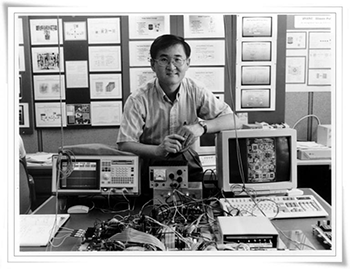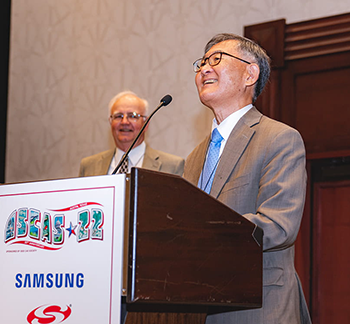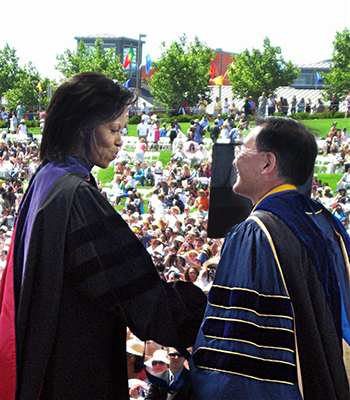Campus News
Steve Kang celebrates a career of seizing challenges
As the first in his family to graduate college and in taking on positions as the second dean of the Baskin School of Engineering and chancellor of UC Merced, Sung-Mo “Steve” Kang has always been someone ready and willing to take on challenges.

As the first in his family to graduate college and in taking on positions as the second dean of the Baskin School of Engineering and chancellor of UC Merced, Sung-Mo “Steve” Kang has always been someone ready and willing to take on challenges.
Over the years, Kang has proved himself to be both an excellent scholar and administrator. He is renowned in the field of electrical engineering for his role in the research and development of modern microprocessors, holds 16 patents, has published more than 500 journal and conference papers, has co-authored ten books, and has mentored more than 60 Ph.D. students in his Nanoelectronic Integrated Systems Laboratory lab. Kang was the first Korean American to head a major research university.
After nearly a half-century in academia, the Distinguished Professor of Electrical and Computer Engineering (ECE) and Dean Emeritus is retiring from most of his faculty duties, and will stay on at UCSC as a professor emeritus. Kang reflects with pride on his career and the rewards of building up fledgling programs.
Early years
Born in Yangpyong, a suburb of Seoul, Korea in 1945, the year the country gained independence from Japanese rule, Kang grew up during a time of great transition. His grandfather was an activist in the indepence movement against Japan, creating hardship for the family, and Kang grew up amidst the Korean War.
In high school, Kang liked physics and math, and felt drawn toward the intellectual and theoretical challenges of electrical engineering. He also credits his family for setting him on his path.
“I received great influence from my grandfather, who said “Ay, Sung-Mo, you should study electrical engineering and go to the U.S.!” Kang said. “In a sense, I realized his dream for me.”
After three years in the Korean Air Force and completing most of his undergraduate schooling at South Korea’s prestigious Yonsei University, Kang came to the U.S. in 1969 on a full scholarship to finish his bachelor’s at Fairleigh Dickinson University in New Jersey. Although he didn’t know her yet, his wife, Myoung, was already in the state, having also emigrated from Korea to study math and computer science at Fairleigh Dickinson University a few years before. They were married in 1972 and took their honeymoon in California, the same year Kang started his doctoral research in electrical engineering at UC Berkeley.
Kang’s first job out of graduate school was an assistant professorship at Rutgers University, which he says he was lucky to obtain during a period of job shortages when even Ph.D. students were pumping gas to make ends meet. After teaching for two years, he switched to industry to do groundbreaking work at AT&T Bell Laboratories where he led the development of the world’s first 32-bit microprocessor chips.
In 1985, he took a tenured professorship at the University of Illinois Urbana-Champaign, and after 10 years was elevated to the head of the electrical and computer engineering department to oversee more than 100 faculty, a program recognized as one of the best in the nation.
A trailblazer for Baskin Engineering
Following his role as the department head at UIUC, many schools were eager to recruit Kang as their dean, but the nascent Baskin School of Engineering in scenic Santa Cruz won him over. Proximity to Silicon Valley, the strength of the UC system, and the opportunities and challenges to develop the new school led him to choose UCSC over more established programs, and so Kang became Baskin’s second dean in 2001, following Pat Mantey, who had recruited leading faculty and established valuable ties with nearby Silicon Valley.
In his new position, Kang was tasked with recruiting faculty and raising the visibility of the school, both of which he excelled at. In his tenure as dean, he doubled the size of the faculty, quadrupled federal research funding from $5 million to $20 million, and grew the school’s scholarship fund by ten fold. These days, the school is home to more than one fourth of the university’s undergraduate students and more than a third of its graduate students.
“Like me, Steve was a researcher at AT&T Bell Labs during an exciting era of progress and innovation in technology,” said Alexander Wolf, dean of the Baskin School of Engineering. “During his time as dean, Steve’s dedication to recruiting the highest quality faculty and his leadership in expanding the physical footprint of the school have left a lasting legacy, setting up our current and future students, faculty, and staff for success.”

When he arrived, the four-year-old school already had programs in information technology such as electrical engineering and computer science. Kang decided to build out programs in biotechnology and nanotechnology, leading to the formation of the biomolecular engineering department. At about that same time, President Bill Clinton announced the first assembly of the human genome, a revolutionary achievement for which UCSC engineers provided the computational solution. The UCSC Genomics Institute is now a leader in the field, involved in visionary research such as the Telomere-to-Telomere Consortium and the Pan-Cancer Project. And more broadly, Baskin Engineering has staked its claim as a pioneer in games and playable media, data science, and other future-facing areas of research and education, while hosting a fast-growing percentage of the university’s undergraduate and graduate students.
To recruit faculty, Kang remembers he bought many copies of the book Regional Advantage: Culture and Competition in Silicon Valley and Route 128 and gave them out to candidates, hoping they would read it and understand the opportunities presented by easy accessibility to the emerging tech world. To raise the visibility of the program, he focused on recruiting top graduate students who went on to take positions at prestigious universities. Now, he is happy to see world-class faculty and students come to study in Santa Cruz.
“I’m very pleased because these days when we offer interviews and positions to top candidates, in most cases they choose to come to UC Santa Cruz, which is a very good sign,” Kang said.
Kang says his biggest challenges in developing the school were based on tight budgets due to small enrollment and the limited availability of physical space. But those problems were no match for the resourceful dean: leveraging funding from the UC system, UC’s Center for Information Technology Research in the Interest of Society (CITRIS), The California Institute for Quantitative Biosciences (QB3), and the school’s namesake Jack Baskin, Kang oversaw the building of the E2 building and Baskin Auditorium, providing 150,000 square feet of new office, laboratory, and classroom space.
He also used limited funds to hire a grant writer to help faculty write successful proposals, which paid off as several programs were established that brought research money and visibility to the school. Kang led the successful establishment of the interdisciplinary NSF-funded Center for Biomimetic Microelectronics, in collaboration with USC and CalTech. The school also became a NASA university-affiliated research center, a ten-year program that facilitated many research grants for work in a variety of areas including air-traffic control, nanotechnology, and IT technology. This legacy of collaboration across divisions and institutions continues today in efforts such as a visionary project on cyber-physical systems which was recently awarded a major NSF grant, and work to create the first Human Pangenome that represents human genomic diversity.
“I thank the administrators, then-chancellor MRC Greenwood and then-provost John Simpson, for trusting me to take over as the second dean of engineering, which opened up opportunities for me to be innovative, work hard, recruit good people, and build up the program,” Kang said. “I am very pleased with the way the school of engineering has developed.”
Along the way, Kang inspired students with an interdisciplinary approach to engineering education, and advice that went beyond just academia and inspired life-long learning.
“One time when we were discussing professional life, he said, ‘Just think like your boss,’” said Le Zheng, a mentee of Kang’s who graduated with a Ph.D. in ECE in 2015. “I thought that was tremendous advice and insight that I tried to apply to my work wherever I went. This principle allows me to come out of my little bubble and look at things on a broader and higher level, which really helps to put my work into perspective and motivates me to set the correct priorities that align with a bigger mission.”
Going forward, Kang hopes to see the school continue to expand its graduate programs, see alumni gain success in the field, and build on diversity, equity, and inclusion programs – a goal which he is taking action toward through the “Sung-Mo Steve Kang DEI Award” for faculty.
Leading UC Merced
After finishing five years as Dean and entering his second term, Kang was eager to take on a new challenge, and sure enough one presented itself: the newest UC, UC Merced in the San Joaquin Valley, was looking for its second chancellor.
“I have an attitude to not repeat the same thing,” Kang said, “So I was hoping that some change would be good. When the UC Merced opportunity arose I was called by a recruiter to see if I would be interested, and I knew it was a tough competition but I said ‘yes, why not, I’m willing to try!’”
After rising above the competition and being offered the position in early January 2007, Kang was so eager to “jump into hot water” that he began March 1. One of his first actions was an extensive listening tour around the Central Valley to understand the unique needs of his students, many of whom, like Kang, are the first in their family to attend college and come from low-income households.
Early into its life and amid the Great Recession, UC Merced held the immense potential of a new campus but was stymied by tight budgets and limited physical space. At one point, more than 38 department chairs at UC San Diego signed a petition to shut down UC Merced in the face of budget shortages, an effort which ultimately failed.
Among Kang’s major accomplishments as chancellor were the attainment of enormously important environmental permits that allowed for the expansion of the campus and significant increases in enrollment.

In partnership with then UC Vice President (now current UC President) Michael Drake, Kang established the UC Programs in Medical Education (PRIME) in response to the region’s need for more doctors. The program, which has since greatly expanded, recruits talented medical students to go on to work in underserved communities and with underserved populations – in the case of UC Merced, in the Central Valley.
In 2009, a successful student-led campaign invited then-first lady Michelle Obama to speak at the university’s commencement ceremony and commemorate the university’s first graduating class to spend four years at UC Merced, an event which brought major visibility to the campus.
In 2011, Kang returned to UCSC to focus on teaching and research, but it wasn’t long before he was recruited to run another university, this time in his home country. Korea Advanced Institute of Science & Technology (KAIST), known as the MIT of South Korea, was facing a period of turmoil in leadership, and called on Kang to set them back on the right track. In his four years as president, Kang says he was able to reestablish a culture of respect amongst faculty and leadership.
Transformational research
As a researcher, Kang’s contributions to electrical engineering are reconized internationally and used by people worldwide in their day-to-day lives. His work is focused on very large scale integrated (VLSI) circuits, the kind of microchips found in mobile devices such as phones and laptops that require low power consumption to lengthen battery life. Kang contributed to the earliest research surrounding memristor technology, a building block for electrical circuits that retains memory of energy flow without power.
The technology was first described and named in 1971 in a groundbreaking paper by Leon Chua, a professor of electrical engineering at UC Berkeley, who, the very next year, became Kang’s Ph.D. advisor. Kang joined Chua’s foundational, theoretical research exploring the concept and incorporated the technology into the thesis he submitted in 1975.
“[Chua] asked me if I would be interested in working on it, and since it was a new concept, I was interested in working on the research, but at the same time I asked him, as an immigrant student, ‘will I be able to find a job if I work on it, since it’s so new?’” Kang said.
But the risk paid off when, in 2008, fabrication of the technology was finally made possible by a team at Hewlett Packard. In between his duties as chancellor at UC Merced, Kang organized a symposium for memristors that launched the technology into prominence. Now, memristive technology is extremely prevalent – Kang says journal editors complain about how many papers they receive on the concept.
Kang says in the future we will see the technology mostly used in machine learning and artificial intelligence, where it can be more efficient at realizing these applications in high-packing density – the art of packing lots of memory in a small space. His ongoing research is mostly focused on how we can mimic the brain using memristor technology.
“It turns out, the human brain is the most efficient low-power engine,” he said. “We consume very, very low power, and yet the human brain can do a lot of things – computation, memory, logic, and all that.”
In retirement, Kang intends to guide his last two Ph.D. students to the completion of their doctoral degrees and continue his research on building a human brain-like function using memristors and CMOS circuits, and pushing the envelope of low-power technology. Also, he looks forward to attending an upcoming reunion of his former Ph.D. students.
Kang is a Fellow of IEEE, ACM and AAAS, a Foreign Member of the National Academy of Engineering of Korea, and a member of the Korea Academy of Science and Technology (KAST). He was the Founding Editor-in-Chief of the journal IEEE Transactions on Very Large Scale Integration (VLSI) Systems and has served as a member of the Board of Governors, Secretary and Treasurer, Administrative Vice President, and the 1991 President of IEEE Circuits and Systems Society with more than 15,000 members.
Kang served as President of the Silicon Valley Engineering Council and was inducted into the Silicon Valley Engineering Hall of Fame in 2009. He has also served on the California Council of Science and Technology, UC President’s Science and Technology Board, the Central Valley Higher Education Consortium Board, the MentorNet Advisory Board, and as Chairman of the Board of the Great Valley Center.
“Steve’s contributions to Baskin Engineering laid the foundations for both our school’s academic strengths and a culture of collaborative, inclusive education,” Wolf said. “His recent establishment of the ‘Sung-Mo Steve Kang DEI Award’ fortifies our ongoing efforts to support a talented, diverse faculty that are dedicated to the success of our students and the promotion of our research mission to create socially responsible technology.”